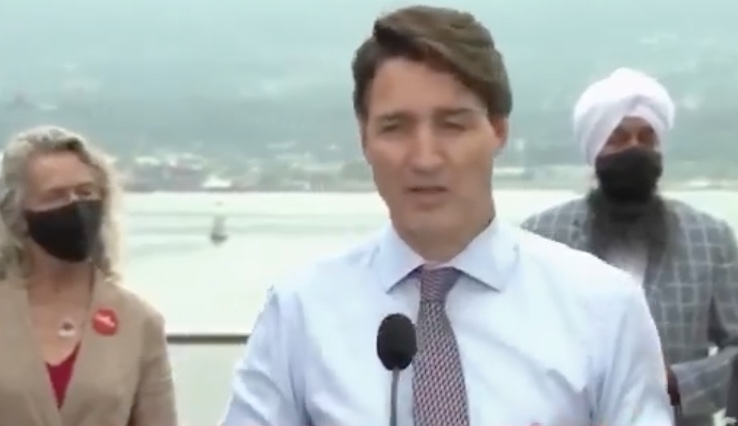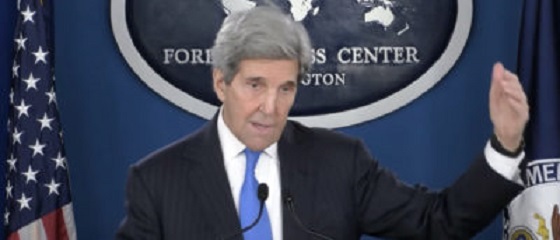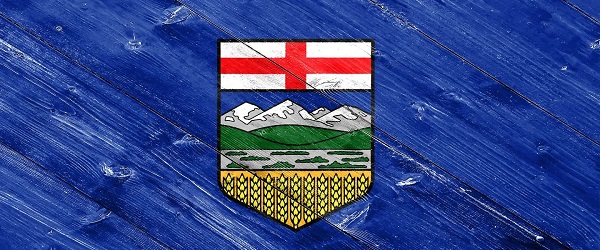Opinion
PM Trudeau’s “Monetary Policy” gaffe could cost the Liberals the election. But will it?

Back in 1993 things were not going well for Canada’s Progressive Conservative Government. Brian Mulroney’s government had served 2 mandates and Canadians were clearly ready to move on. The Conservatives decided Kim Campbell would be the best leader to bring a renewed excitement to their reelection hopes. Campbell was a fresh face and that was important to the party which was losing support quickly. She was also from Vancouver, which was a nice change for the party normally represented by leaders from Ontario or Quebec. Even more importantly, when she won the leadership she would become the first female leader of a country in North America. As Canadians would discover just a few months later though, no one cared about any of that. That campaign did not go well. The Conservatives not only lost. They were decimated right out of official party standing. The governing party won just 2 seats in the entire nation (Jean Charest in Quebec, and Elsie Wayne in New Brunswick). Kim Campbell did not even win her own seat. Henceforth the Reform Party represented the Conservative voice for the next two elections.
For one reason or another, Canadians simply did not connect with Kim Campbell. One of the biggest gaffes of that election campaign came when a reporter pressed Campbell for details on an issue and she replied “The election is not a time to discuss serious issues.” That was the wrong answer. Despite what she may have truly meant, all Canadians heard was “I don’t need to explain anything to you.”. That was exactly the wrong thing to say at the worst possible time.

Why bring this up now, 28 years later? Well Prime Minister Justin Trudeau has made his first major gaffe of this election campaign. And for those who care about monetary policy (which should be everyone who pays taxes and works or has savings, etc) it’s very likely as stunning a statement as Kim Campbell made three decades ago.
First some background. In 2021, Canadians find themselves in an astounding situation. When the covid pandemic hit last year governments all over the world shut down their economies for weeks, and then months. Government stimulus was the order of the day and Canada’s was among the most generous in the world. People were paid to stay at home. Businesses were paid to continue to provide jobs to people working from home. Landlords were paid to keep tenants afloat. All in all, government money is being spent at unprecedented rates.
To pay for all this the Trudeau government attempted to pass a bill through Parliament which would allow it to raise taxes at will without a budget and without even coming back to ask Parliament to present a plan or ask for approval. That didn’t go over so well. But instead of turning back the taps, or introducing a budget with higher taxes the government worked out a plan with the Bank of Canada. How this works basically is that every month the Bank of Canada prints out a few billion dollars, and the government uses that to pay for all the stimulus they want. Over the first year of covid that totalled about 350 Billion dollars!
The Bank of Canada has left the core function expressed in its mandate in order to print all this extra money. Despite it’s best efforts to decouple inflation from the printing of extra money, it’s not working. Canada’s inflation rate has been blowing through the target of 2% month after month after month.
This is the the mandate as expressed by the Bank of Canada itself on its website.
The Bank of Canada is the nation’s central bank. Its mandate, as defined in the Bank of Canada Act, is “to promote the economic and financial welfare of Canada.” The Bank’s vision is to be a leading central bank—dynamic, engaged and trusted—committed to a better Canada.
The Bank has four core functions:
- Monetary policy: The Bank’s monetary policy framework aims to keep inflation low, stable and predictable.
- Financial system: The Bank promotes safe, sound and efficient financial systems within Canada and internationally.
- Currency: The Bank designs, issues and distributes Canada’s bank notes.
- Funds management: The Bank acts as fiscal agent for the Government of Canada, managing its public debt programs and foreign exchange reserves.
The Bank of Canada’s mandate is expiring at the end of this year and the new mandate could change. Some are saying the Bank should continue to print money at an unprecedented rate and Canadians will learn to live with high inflation. Considering this drives up the cost of everything from our homes and vehicles, to the food we eat there could hardly be a more important issue. That’s why PM Trudeau’s response to this question in Vancouver this week is so stunning. When asked if he would consider a higher tolerance for inflation going forward here’s what he said.
Reporter Question about the renewal of the Bank of Canada mandate due at the end of 2021:
-Do you have thoughts about that mandate? Would you consider a slightly higher tolerance for inflation?
Prime Minister Justin Trudeau: “When I think about the biggest, most important economic policy this government, if re-elected, would move forward, you’ll forgive me if I don’t think about monetary policy.”
Of course this spurred an immediate reaction from the opposition Conservatives. That oppostion is perhaps best summed up in this address from Pierre Poilievre.
The question is, will Canadians punish Prime Minister Trudeau for either lacking basic economic knowledge, or not caring about it? Kim Campbell failed to win her own seat, but she did not seem to connect well with Canadians at all even before that election campaign. Justin Trudeau has so far been immune to gaffes. Even though he’s had more than 5 years in government, millions of Canadians stand by him loyally. Will this time be any different?
National
Eco-radical Canadian Cabinet minister resigns after oil deal approved

From LifeSiteNews
Steven Guilbeault, a Quebec MP who had formerly served as Justin Trudeau’s Minister of Environment, said he was leaving the Cabinet because his ‘climate’ policies were being abandoned.
One of Canada’s most radical environmentalist politicians has resigned from Prime Minister Mark Carney’s Cabinet.
Steven Guilbeault, until recently the Culture Minister, quit his position after the federal government struck a deal with the province of Alberta that relaxes environmental regulations and allows the construction of a new oil pipeline.
On Thursday, November 27, Guilbeault, a Quebec MP who had served as former Prime Minister Justin Trudeau’s Minister of Environment, said he was stepping down because his “climate” policies were being abandoned.
“This afternoon, it is with great sadness that I submitted my resignation to the Prime Minister as Minister of Canadian Identity and Culture and Minister responsible for Official Languages, Minister of Nature and Parks Canada, as well as his Lieutenant in Quebec,” he said in a statement.
“When I entered politics, it was because I had a deep conviction that I could make a difference in fighting climate change and protecting our environment. My commitment to leaving a better world for the future of our children and our planet remains unchanged.”
Alberta Premier Danielle Smith and Prime Minister Mark Carney signed on Thursday a memorandum of understanding (MOU) which will let Alberta build an oil pipeline to the coast of British Columbia. It also lessens tanker restrictions and allows Albertan oil to be sold on Asian markets. The pipeline still faces opposition from British Columbia’s ruling New Democratic Party government.
The MOU agreement changes a host of other green-related initiatives that Guilbeault had a hand in, such as imposing an emissions cap on the oil and gas sector and new Clean Electricity Regulations. Under the deal, Alberta will be exempt from these radical environmental regulations.
Premier Smith has been battling Guilbeault over his extreme climate change policies for years now. She said of the recent MOU that, although it’s a “massive win for Alberta and Canada, we will still hold the federal government accountable for keeping their end of the bargain.”
“There’s a lot of work left to do so let’s roll up our sleeves and get the job done, Alberta!” she stated.
Smith has repeatedly defended Alberta from Trudeau-era climate regulations and asserted Alberta’s right to control its power grid, also promising the province will not be “transitioning away” from oil and natural gas. She had called on the then-prime minster to replace Guilbeault because he was too “extreme.” Last year, Smith blasted the Minister after he said the federal government would no longer fund road construction projects and instead funnel the savings to “climate change” projects.
Alberta does have support from the Supreme Court, however, which recently sided in favor of provincial autonomy when it comes to natural resources. The Supreme Court ruled that Trudeau’s law, C-69, dubbed the “no-more pipelines” bill, is “mostly unconstitutional.” This was a huge win for Alberta and Saskatchewan, who challenged the law in court. The decision returned authority over the pipelines to provincial governments, meaning oil and gas projects headed up by the provinces should be allowed to proceed without federal intrusion.
Guilbeault’s extreme eco-activist past
Guilbeault, under Trudeau’s watch, pushed a radical environmental agenda similar to the World Economic Forum’s “Great Reset” and the United Nations’ “Sustainable Development Goals.”
He was as extreme as they come for an environment minister, and his background shows a history of breaking the law for ideological aims. In 1997, he joined Greenpeace and served for a time as a director and then campaign manager of its Quebec chapter for a decade.
He was arrested many times for environmental protests, the most famous arrest coming after an incident in 2001 when he climbed Toronto’s CN Tower with British activist Chris Holden. The pair hung a banner saying “Canada and Bush — Climate Killers.”
Greenpeace is a group that advocates for population control in addition to calling for an end to all oil and gas.
His extreme ideals continued in his role as environment minister. He threatened Saskatchewan Premier Scott Moe, who said that his province would no longer collect a federally imposed carbon tax on electric heat in addition to natural gas, with arrest and jail.
While Minister of Environment, Guilbeault was hoped to create a new “global’ carbon tax applied to all goods shipped internationally that could further drive-up prices for families already struggling with inflated costs.
The reduction and eventual elimination of the use of so-called “fossil fuels” and a transition to unreliable “green” energy has also been pushed by the World Economic Forum – the globalist group behind the socialist “Great Reset” agenda – an organization in which Trudeau and some of his cabinet have been involved.
The reality of Trudeau’s, and then Carney’s push, for so-called renewable energy showed itself just over a month ago when Alberta’s power grid faced near certain collapse due to a failure of wind and solar power.
Daily Caller
John Kerry Lurches Back Onto Global Stage For One Final Gasp


From the Daily Caller News Foundation
John Kerry, one of the grandest and most persistent climate scolds of the 21stcentury, lurched back into the news this week when he was knighted by Britain’s King Charles, a prominent climate scold in his own right.
In fact, their shared efforts involving flying off on carbon-spewing private jets to lecture the masses to live smaller, more costly lives in the name of fighting climate change was the motivation for the award, as the King thanked Kerry for his “services to tackling climate change.” That seems to be a bit of a grammatical error, but when royalty is involved, no one really cares, do they?
“King Charles and I share the same point of view — that there’s an urgency to doing things,” Kerry told the Globe in an interview. “He’s been ahead of most folks on this from the time I can remember… He always had a commitment to nature.”
Unfortunately for the U.K.’s citizens, the Labour government’s “commitment to nature” mainly appears to involve covering thousands of acres of bucolic British farmland with massive solar arrays and felling thousands of forest trees to make home to big wind installations these days.
Projects like those – frequently forced by the central government on objecting rural communities – form the centerpiece of Secretary of State for Energy Security and Net Zero Ed Miliband’s program to deindustrialize the formerly formidable British economy.
That program – based on the shared philosophy of King Charles and Kerry – has sent the U.K.’s utility rates skyrocketing to the highest on earth. It has also rendered the former global power dependent on imports from foreign nations for its energy security, with China the most prominent among them.
Such are the fruits of the King Charles/Kerry “point of view.” Most would agree with Kerry’s statement that “there’s an urgency to doing things.” The problem is that pretty much everything he and the King have been doing in this realm across the first quarter of the 21st century leads inevitably to serfdom to the Chinese Communist Party.
In an interview with the Financial Times the same day, Kerry repeated much of the tiresome dogma of his alarmist religion, in the process excoriating President Donald Trump as a “denier” and calling U.S. corporate leaders cowards for straying from the narrative he and the King prefer. “It is not that they don’t believe [in climate change] or they don’t want to move forward. They are just scared,” Kerry said of the corporate CEOs, adding, “The process of Donald Trump in the last months, coupled with the justice department, coupled with his vengeance programs, has scared… a lot of people.”
But a more believable alternative explanation for the shift away from the twin manias of ESG and DEI by many companies in recent years is that these corporate leaders have a fiduciary duty to maximize returns on capital to their investors. The problem for Kerry and his disciples is that the preferred alternatives they have advanced too often devolved into unprofitable boondoggles that fail to satisfy that duty. Kerry wants to place the entire blame on Trump – who, ironically, was recently honored by King Charles himself with an unprecedented second state dinner. But the truth is that shift started in earnest in 2023, when Joe Biden’s autopen was still in charge of the ship of American state.
That shift has certainly accelerated this year, as companies have been freed from the incessant hectoring of the Biden government and are now being denied access to the ruinous green subsidies from the IRA that so radically distorted energy markets. This has little to do with climate denialism or cowardice and much to do with sound business practice and CEOs properly carrying out the mandates of their high positions. No amount of hyperbolic talking points from Kerry or the King can change that reality.
In the end, Kerry’s remarks come off as a lot of sound and fury signifying nothing. Now in the twilight of his career, he has become a relic, a totem of a fading global religion whose end cannot come soon enough.
David Blackmon is an energy writer and consultant based in Texas. He spent 40 years in the oil and gas business, where he specialized in public policy and communications.
-

 Alberta2 days ago
Alberta2 days agoFrom Underdog to Top Broodmare
-

 Business2 days ago
Business2 days agoMan overboard as HMCS Carney lists to the right
-

 Daily Caller1 day ago
Daily Caller1 day ago‘No Critical Thinking’: Parents Sound Alarm As Tech Begins To ‘Replace The Teacher’
-

 Alberta2 days ago
Alberta2 days agoFalling resource revenue fuels Alberta government’s red ink
-

 Business2 days ago
Business2 days agoHigher carbon taxes in pipeline MOU are a bad deal for taxpayers
-

 Alberta2 days ago
Alberta2 days agoREAD IT HERE – Canada-Alberta Memorandum of Understanding – From the Prime Minister’s Office
-

 Daily Caller15 hours ago
Daily Caller15 hours agoJohn Kerry Lurches Back Onto Global Stage For One Final Gasp
-

 Alberta1 day ago
Alberta1 day agoAlberta can’t fix its deficits with oil money: Lennie Kaplan



